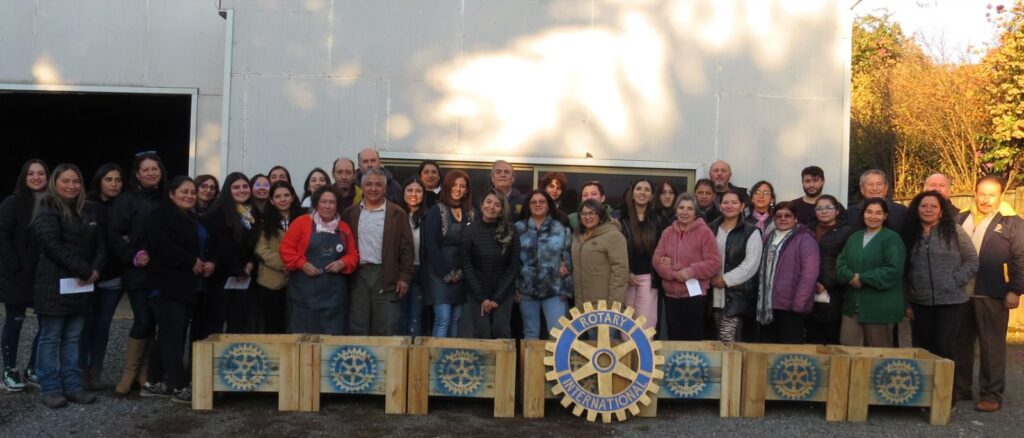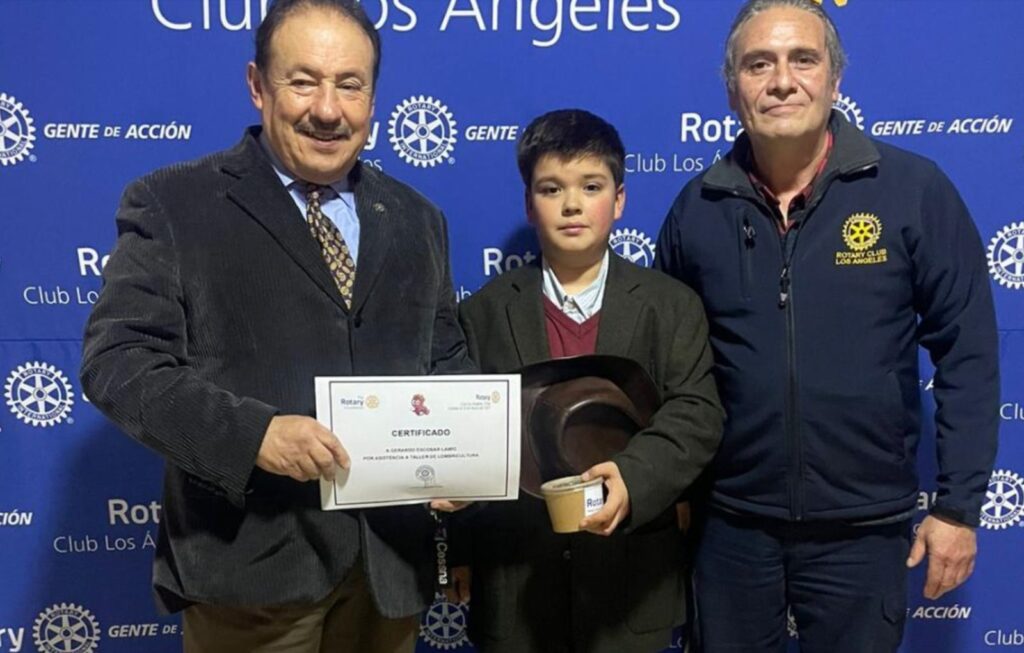by Alex Arancibia Quintana, DVM, Past President, Rotary Club of Los Angeles, Chile, D 4355
A Low-Cost Solution for Organic Waste Recycling
“Feliz como una lumbriz,” or “Happy as an earthworm:” that’s what the Rotary Club of Los Ángeles calls our newest environmental project. On May 18, 2024, one day before World Recycling Day, we held our first provincial workshop on how to use vermiculture to transform organic waste into valuable compost. The workshop was attended by 31 teachers from educational units in the Biobío Province of Chile, five individuals, and officers of the Los Angeles Army Detachment, who will use vermiculture to treat the manure generated by their horses and mules.

Vermiculture Workshop May 18, 2024
The Happy as an Earthworm project operates primarily with schools, but we also invited a representative of PRODESAL, a local development program of the Chilean Ministry of Agriculture. Each municipality has a PRODESAL team providing technical assistance to micro producers: farmers struggling to support their families despite having to work in fragile ecosystems under pressure from climate change, water shortages, and other challenges. In many locations, PRODESAL uses school facilities to develop activities with the parents of the students and the wider community. Depending on the results of this first outreach, we hope to expand the project to other communes with PRODESAL.
Pollution by organic waste is a global problem. Vermiculture is an economical way to transform the problem of organic waste into a valuable resource: vermicompost. Teachers in our province have supported this project and are planning to incorporate it into their curriculum. Counting just the educational units represented by the 31 teachers, this workshop has the potential to reach 6,000 students and 700 teachers as direct beneficiaries. By disseminating information about vermiculture, schools have the potential to greatly multiply the impact in students’ homes and the community at large.
The total cost of the project was only US$1,500: US$1,000 from a Rotary Foundation District Grant (D 4355, Chile) and US$500 from the Rotary Club of Los Angeles.
Empowering Schools with Vermiculture
I am a veterinarian in our club who did my thesis on wastewater treatment with vermiculture, and I am passionate about this topic. I started the workshop with a talk about the biology, ecology and zootechnical aspects of the earthworm Eisenia foetida. Then, the president of the Ecolombriz Corporation, Fabiola Cid Hiche, gave a theoretical-practical talk on homemade vermiculture.

PDG Gerardo Escobar Lamig, his grandson Ian Schrader Escobar, and Alex Arancibia Quintana, DVM
Attendees received a technical manual and a wooden vermiculture as a gift. Their task was to study, collect and prepare the food that their worms were going to receive. Two weeks later, on Thursday, June 6, attendees received a worm core and a certification diploma.
For the technical manual, wooden composting bins, and worm cores, the cost of our project per school was only US$32. This is a project that is within the scope of local Rotary clubs around the world. For very little expense, plus a few hours of direct volunteer service organizing and leading the workshop, you can equip schools and homes to implement a self-sustaining circular economy alternative to the pollution resulting from the disposal of untreated organic waste: fruit and vegetable peels, spoiled or damaged fruits, paper and cardboard. Worms eat and process paper very well!
For participants in this workshop, we built simple wooden composting boxes sized for a five-person household. Schools can start with these and then increase the breeding area as the worm population increases. Eisenia foetida doubles its population every 2-3 months, depending on temperature and other factors. This natural population growth has the potential to equip schools to recycle all of their organic waste. Without any additional expenditure for worms, schools will generate surplus worms that students or teachers can take home or share in their immediate community.
Transforming Waste into Opportunity
We estimate that for every 500 kg of waste, between 200 and 300 kg of vermicompost can be produced. Worm castings (vermicompost or lumbricompost) are an excellent fertilizer and soil conditioner. Schools can use it on campus or sell it. This worm biomass has between 60% and 70% protein and can also be used in animal feed, so schools could complement their greenhouses with simple animal husbandry: birds or fish, for example. Thus, vermiculture can be used to develop a farm at school. Teachers can use these activities to enhance courses such as biology, chemistry, and physics, providing motivation and opportunities for experiments and fostering enthusiasm for science.
As far as I know, our club’s vermiculture education initiative is a first in Rotary International and in Chile. It is based on the environmental measures that our Club and Rotary International have undertaken over the past few years. The Rotary Club Los Angeles’ first eco-initiative was Project ROTABEE. By launching digital poster contests, videos and murals on streets and businesses, we have been raising awareness and care for bees in the community. Additionally, during the pandemic, we combined environmental management with the promotion of community economic development through the delivery of homegrown vegetable seedlings. In 2022, we began construction of greenhouses in several locations in Los Angeles. Both initiatives have continued to this day.
Here are some links to Spanish-language resources you can use to learn more:
- Agroflo’s Manual Lombricultura (Vermiculture Manual)
- A slideshow providing an overview of vermiculture and recycling
- A 15-minute video on the speed and value of vermiculture as an environmental solution to prevent the accumulation of organic waste.
If you’d like see how this solution can be taken to scale, this video takes you on a tour of MAXHUMUS, the huge mechanized vermiculture facility in Gómez Palacio, Durango, México.
We would be happy to correspond with any readers interested in replicating this project. You can contact us at rotaryclublosangeles@gmail.com
Dr. Alex Arancibia Quintana is Past President (2023-24) of the Rotary Club of Los Ángeles, Chile
Photo credits: Rotary Club Los Ángeles, Chile

